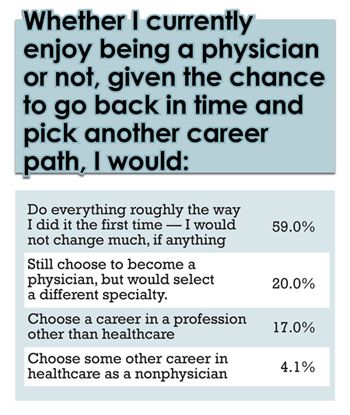
Just who is the modern American physician? It’s a question that pop culture has done a lousy job answering. We decided it was time to shatter the myths. The result is our most revealing survey ever.

Just who is the modern American physician? It’s a question that pop culture has done a lousy job answering. We decided it was time to shatter the myths. The result is our most revealing survey ever.

You see your spouse and kids every day, but you might not always tell them how you really feel - especially when it comes to your job. Read on to see what your peers had to say to their families.

Are you considering a new career path? Curious about your options, or simply looking for new ways to find balance in your life? In this podcast, Michelle Mudge-Riley, who consults with physicians interested in transitioning into nonclinical jobs, discusses the chief complaints of practicing physicians and explores available career options.

She’s a touchy-feely doctor who likes to hug. But when her boss wondered only whether she’d billed for a consult when giving a patient a cancer diagnosis, OB/GYN Robin Carter decided she’d had as much as she could take.

By now you’ve heard all the assumptions that people make about doctors. You’re a bunch of wealthy, country-club Republicans driving Beemers and living near golf courses. Or are you?

As part of our Great American Physician Survey (which will run in the October 2009 issue) we asked physicians “What healthcare reforms would you like to see?” Curious about the top issues? Read for yourself.

Sometimes Nanci Hawkins can’t decide whether she’s an OB/GYN or a sandwich maker at a lunch counter.

Gastroenterologist Richard Bloomfeld explains how he finds inner peace by kicking, punching, and screaming.

Internist and nephrologist Dalia Frumkin recalls an early mentor, who taught her a lot about being a doctor.

Many physicians think membership in professional associations is the best way to affect change. Others think associations are bloated bureaucracies that don’t earn the dues they collect. Maybe they’re both right?

Rob Lamberts, MD, on the benefits of partnership over working solo.

Each issue we offer advice on a real physician’s vexing problem. This month: A newbie gets help on scoring that dream partnership offer.

We give you the topic, you give us the essay. Leading off is retired country doctor A.E. Miller, who recalls the patient who helped make him the man he is today.

It’s true that more physicians are choosing group practices, but reports of the death of the solo practice have been greatly exaggerated.

Feeling a little grouchy lately? Read our account of one comedian turned business-savvy pediatrician, who claims laughter helps when he’s stumped by a humorless healthcare system.

Nearly one American physician commits suicide each day. One a day. This grisly stat is well-known among physicians, even if it seems counterintuitive to the general public. Physicians, after all, are smarter, more accomplished, and better-paid than the average person. They’re on top of the world, aren’t they?

Robert Posner and Herbert Parris have never met, but they have a lot in common. Both internists, each became frustrated with the “third-party tango” and decided to break out of the mold. Read how they rejuvenated their practices with a little creativity and a lot of moxie.

Pulmonologist Jerome Arnett Jr. on the folly of so-called medical “professionalism.”

Our six-part series on everything you need to know to open a practice begins this month with a comprehensive guide to the crucial planning stages. Whether you’re just thinking about starting out on your own, gung-ho to get going, or even running your own practice already, you can’t miss this series.

If you think it’s tough being a physician these days, try being a doctor’s spouse or kid. Your family is affected by your challenging, grueling (and, at times, disappointing) choice of career, too. You promised to stick by each other for better or worse. Here’s some help making it work.

Rob Lamberts, MD, explains why he keeps an online journal, or “blog,” and whether you should, too.

That is the question. The answer is different for each physician. Partnership means more money but more headaches - and risk. Here’s how to decide on a path that’s right for you.

Michael J. McLaughlin, MD, on the hardest, and best, decision of his career: quitting clinical practice.

John Ingalls, MD, explains how he built his ideal practice by putting his own (and his family’s) happiness first.

When it comes to your compensation, maybe it’s time to rethink your assumptions.